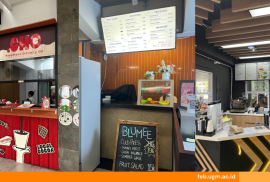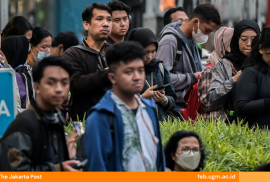The Faculty of Economics and Business of Universitas Gadjah Mada (FEB UGM) has received a donation of inorganic waste bins from BRI (Bank Rakyat Indonesia). This support is part of efforts to improve waste management on campus.
The symbolic handing over of the donation was done by the Regional Funding and Retail Transaction Banking Head of BRI Regional Office Yogyakarta, Fendi Maulana, to the Secretary of the Directorate of Partnerships and Global Relations at UGM, Wiratni Budhijanto, Ph.D., and the Head of Administrative Office of FEB UGM, Agus Ridwan, S.P., M.M., on Friday (August 30, 2024) at FEB UGM. FEB UGM is one of 18 faculties, two schools, and several dormitories at UGM that received the inorganic waste bins. BRI provided 50 units of inorganic waste bins valued at Rp 242,016,075 to be distributed throughout the UGM campus.
Fendi Maulana stated that donating these inorganic waste bins aims to improve the convenience of waste management at UGM. Through this contribution, UGM can better perform and facilitate waste management services to maintain cleanliness without harming the surrounding environment.
“Not only do we want to help with waste management on campus, but we also want to educate the community about waste management,” he said.
Secretary of the Directorate of Partnerships and Global Relations at UGM, Wiratni Budhijanto, Ph.D., expressed her appreciation for BRI’s donation. She said he hoped the waste management collaboration would continue at UGM.
“This assistance is not only about the physical aspect but also serves as an educational tool to learn how to sort waste,” she noted.
Meanwhile, the Head of Administrative Office of FEB UGM, Agus Ridwan, S.P., M.M., said that FEB UGM is firmly committed to supporting waste reduction efforts on campus. This commitment has been realized through waste segregation by type, tumblers, and various other innovative waste management programs.
“During the recent campus orientation at FEB, we also encouraged new students to use personal tumblers and lunch boxes as part of our efforts to reduce waste on campus,” he added.
Agus noted that BRI’s donation of inorganic waste bins is a positive step in supporting waste management on campus. Placing these bins in strategic locations within the faculty can serve as an educational tool for the academic community and the public to dispose of properly and sort waste.
Reportase: Kurnia Ekaptiningrum
Sustainable Development Goals











